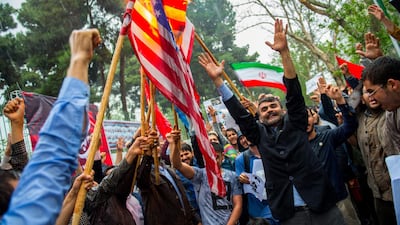This week, Donald Trump did not just withdraw the United States from the Iran nuclear deal. He shredded the axioms that have governed Tehran's thawing relations with the signatories to the agreement. Since coming into effect in 2015, the deal – negotiated with Tehran by the permanent members of the UN Security Council plus Germany – has become a kind of constitutional framework for dealing with Iran. Having failed to persuade Mr Trump to stay in the deal, leaders of France, Britain and Germany have now said they intend to keep it alive. Barack Obama, Mr Trump's immediate predecessor, who regarded the deal as his signature foreign policy achievement, has said that Mr Trump's decision leaves the US with a "choice between living with that threat [of a nuclear Iran] or going to war to prevent it".
The assumption underlying all these reactions is that the nuclear deal succeeded in constraining Iran. The truth is that, while enriching Iran's rulers, the deal did little to diminish the capability of the Iranian regime to develop nuclear weapons in the future. Nor did it precipitate the conditions for peace its champions promised it would: Tehran has tested new ballistic missiles to intimidate its neighbours, supplied deadly missiles, in violation of a UN arms embargo, to Yemen's Houthi militas, who then fired them at Saudi Arabia, prolonged the Syrian civil war by bolstering Bashar Al Assad's regime and used its Lebanese proxy Hezbollah to wreak havoc in the region. This explains why Saudi Arabia, Bahrain and the UAE – which saw threat levels from Iran increase rather than decrease after signing the deal – have welcomed Mr Trump's withdrawal from it.
Those who argue that the deal was the only route to curbing Iran's nuclear ambitions are stuck in a past when the US had a heavy presence in Iraq and Tehran had a degree of leverage. The world is a different place today. There is a rising tide of rage against the flawed Iranian regime at home; the sanctions reimposed by Mr Trump will squeeze it further. It now faces being deprived of funds, conflict abroad in the face of its empirical aspirations and an angry populace at home. As Dr Anwar Gargash, the UAE's Minister of State for Foreign Affairs, tweeted, Mr Trump's decision creates an opening for a new, more effective plan. But Tehran will do everything to exploit the gulf that has opened up between the US and its allies. It can no longer be emboldened by the protection of the deal to continue its regional aggression undaunted. All those with an interest in a peaceful Middle East should unite and strive for a more nuanced settlement that could actually lead to a nuclear-free Iran, rather than the hope of one.

